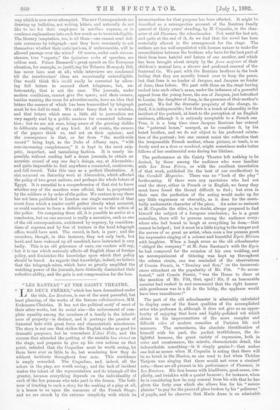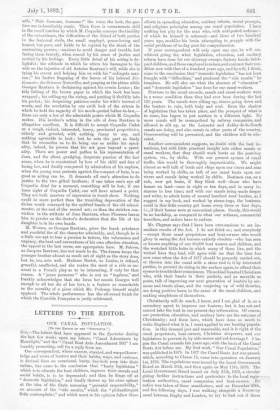" LES RANTZAU" AT THE GAIETY THEATRE.
TES DEUX FRERES," which has been dramatised under the title, Les Bantam., is one of the most powerful, but least pleasing, of the works of the famous collaborateurs, MM. Erckmann-Chatrian. It has not the political motif of most of their other works, but its social aim—the enforcement of com- plete equality among the members of a family in the inherit- ance of property—is distinct, and it portrays the passion of fraternal hate with great force and characteristic minuteness. The story is not one that strikes the English reader as good for dramatic purposes, but he remembers L'.A.mi Fritz, and the success that attended the putting of the amiable bon vivant on the stage, and prepares to give up his own notions on that point, satisged that the Coquelins must be worth seeing, let them have ever so little to do, but wondering how they do without incidents throughout four acts. This confidence is amply rewarded. The Coquelins, and, indeed, all the actors in the play, are worth seeing ; and the lack of incident makes the talent of the representation and its triumph all the greater, because everything depends on the individuality of each of the few persons who take part in the drama. The bold- nese of trusting to such a story for the making of a play at all, is a lesson to us upon the resources of the French Stage; and we are struck by the extreme simplicity with which its
reconstruction for that purpose has been effected. It might be described as a retrospective account of the Rantzau family quarrel of thirty years' standing, by M. Coquelin, in the char- acter of old Florence, the schoolmaster. Not until the last act, and quite at the end of it, do we find that the novel has been materially altered in the arrangement for the stage. The authors are too well acquainted with human nature to make the reconciliation between the brothers who have for the best part of their lives been hateful and haters of one another, and which has been brought about simply by the force majeure of their children's mutual love, a sincere and profound renewal of the fraternal tie. We part with the Rantzau brothers in the book feeling that they are morally bound over to keep the peace, but that Jean is no fonder of Jacques, and Jacques no fonder of Jean, than before. We part with them on the stagO having rushed into each other's arms, under the influence of a powerful appeal from the young lover, the son of Jacques, just betrothed to Louise, the daughter of Jean, in the presence of their mother's portrait. We feel the dramatic propriety of this change, in- deed, it is indispensable ; but there is a touch of absurdity in the incident of the portrait, at least to the perception of an English audience, although it is seriously acceptable to a French one True, it is a long time since Jacques Rantzau has entered the "paternal house," usurped, as he considers it, by his hated brother, and we do not object to his profound saluta- tion of the portrait; but one cannot resist the reflection that the irrepressible French mother, whose picture, or tomb, is so freely used as a dens ex machind, might sometimes make better fellows of her sentimental sons during her lifetime.
The performance at the Gaiety Theatre left nothing to be desired, by those among the audience who were familiar with Les Deux FAres, or with the excellent translation of that work, published (to the best of our recollection) in the Cornhill Magazine. There was no "book of the play" forthcoming. if there were any spectators who had not read the story, either in French or in English, we fancy they must have found the thread difficult to find ; but even in their case the perfection of the acting would make up for any little vagueness or obscurity, as it does for the essen- tially undramatic character of the piece. An actor so eminent as M. Coquelin the elder, is, no doubt, always prepared to find himself the subject of a foregone conclusion ; he is a great comedian, there will be persons among the audience every- where who feel bound to laugh at everything he does,—that cannot be helped ; but it must be a little trying to the temper and the nerves of so great an artist, when even a few persons greet his impressive singing of a solemn and. beautiful Kyrie Eleisoll, with laughter. When a laugh arose as the old schoolmaster "obliged the company" at M. Jean Rantza.u's with the Kyrie he had composed for the occasion of his own wedding, and an accompaniment of tittering was kept up throughout the solemn strain, one was reminded of the observations of Cousin Fenix, in " Dombey and Son," on the inconveni- ences attendant on the popularity of Mr. Pitt. "So accus- tomed," said Cousin Feenix, "was the House to cheer at the mention of Mr. Pitt, that, egad ! Sir, if an honourable member had rushed in and announced that the right honour able gentleman was in a fit in the lobby, the applause would have been tumultuous 1" The part of the old schoolmaster is admirably calculated to display some of the finest qualities of the accomplished actor who performs it, although it does not give us an oppor- tunity of enjoying that keen and highly-polished wit which shines in his impersonations of the more complex and difficult roles of modern comedies of Parisian life and. manners. The earnestness, the absolute identification of himself with his part, the perfect truthfulness, the de- lightful humour, the great variety of expression, both in voice and countenance, the minute, characteristic detail, the indescribable something—is it simply genius P—that makes one feel as secure when M. Coquelin is acting that there will be no break in the illusion, as one used to feel when Th6rese Tietjens was singing that there would not come a strained note,—these are all present in his performance of Florence, in Les Rantzau. His face beams with kindliness, good-sense, sim- plicity, and twinkles with a quaint humour ; for instance, when he is considering how he may conceal from his wife that he has given the forty sous which she allows him for his "menus plaisirs" to pay for the panes of glass broken by his " polissons " of pupils, and he observes that Marie Anne is an admirable wife, " Mais 6conome, 6conome !" the voice, the look, the ges- ture are indescribably comic. Then there is consummate skill in the small touches by which M. Coquelin conveys the timidity of tho subordinate, the difficulties of the friend of both parties in. the fraternal strife, the small employ6, peace-loving and honest, but poor, and liable to be injured by the shock of the contending powers,—anxious to avoid danger and trouble, but facing them bravely, when roused by his sense of justice and excited by his feelings. Every little detail of his acting is de- lightful; the attitude in which he utters his harangue to his wife on the injustice of old Antoine Rantzau's will, while she is tying his cravat and helping him on with his "redingote mar- ron ;" his furtive fingering of the leaves of his beloved Die- tionnaire dee Sciences Naturelles, and peeping at the plates while Georges Rantzau is declaiming against his cousin Louise ; the tidy folding of the brown paper in which the book has been wrapped ; his rolling-up the string, and putting it thriftily into his pocket; his despairing patience under his wife's torrent of words, and the revelation by one swift look of the esteem in which he held the sagacity of his much-quoted father-in-law,— these are only a few of the admirable points which M. Coquelin makes. His brother's acting in the rote of Jean Rantzau is altogether excellent. It is difficult to accept Coquelin Cadet as a rough, violent, interested, heavy, provincial propriitaire, elderly and grizzled, with nothing funny to say, and nothing agreeable to look ; but he acts the part so finely that he reconciles us to its being one so unlike his speci- ality, indeed, he proves that his art goes beyond a speci- ality. There are power and pathos in his representation of Jean, and the silent, grudging, desperate passion of the last scene, when he is constrained by love of his child and fear of losing her, and finally conquered by admiration of his nephew, when the young man protests against the compact of hate, is as good as acting can be. It demands all one's attention to do justice to the two gifted brothers; if one takes one's eye off Coquelin Ain6 for a moment, something will be lost; if one loses sight of Coquelin cadet, one will have missed a point.
• They are both masters of expression in dumb show. Nothing could be more perfect than the trembling deprecation of the divine wrath conveyed by the uplifted hands of the old school- master, at the end of the second act; or than the stricken con- viction in the attitude of Jean Rantzau, when Florence leaves him to ponder on the doctor's declaration that the life of his daughter is in his own hands.
M. Worms, as Georges Rantzau, gives the frank petulance and youthful fire of the character admirably, and, though he is a little too apt to tear a passion to tatters, the vehemence and urgency, the heat and earnestness of his own effective situation, the appeal in the last scene, are appropriate here. M. Febvre, as Jacques Rantzau, has not much to do. The drama keeps the younger brother almost as much out of sight as the story does, but he, too, acts well. Madame Bartet, as Louise, is refined, graceful, unaffected, and she makes the most of a role so un- usual in a French play as to be interesting, if only for that reason. A " jeune personne " who is not an "ingenue," and frankly acknowledges that she loves her cousin Georges well enough to all but die of her love, is a feature as remarkable as the morality of a piece which Mr. Podsnap himself might applaud. The whole performance has the all-round. finish for which the Com6die Francais° is justly celebrated.



































 Previous page
Previous page